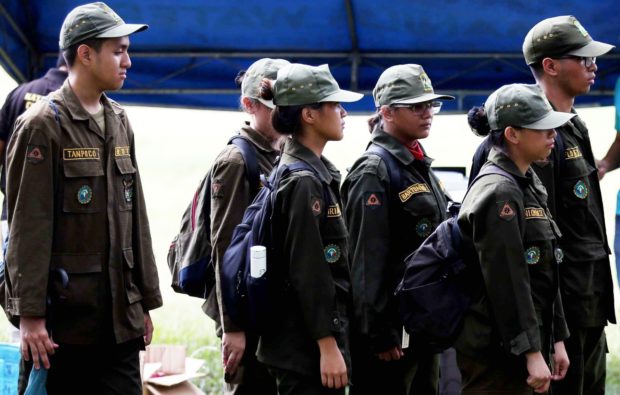
CAMPUS CADETS President Duterte wants to reintroduce ROTC as a compulsory course for Grades 11 and 12 students, but some groups say the cadet course would only be teaching students the power of the gun. INQUIRER FILE PHOTO
Youth groups have condemned President Rodrigo Duterte’s declaration that he is inclined to make the Reserve Officers’ Training Corps (ROTC) program mandatory for Grades 11 and 12, citing the culture of violence and student rights violations that stemmed from it in the past.
The President has said he planned to issue an executive order that will revive the compulsory ROTC program if Congress fails to pass a law on the matter.
He has been pushing for the return of ROTC in public and private schools since early 2017.
But a national network of children’s organizations said ROTC would teach students “brutality, fascism, corruption and impunity” despite the President’s objective of “instilling nationalism, discipline and respect for human rights among the Filipino youth.”
“With the fascist and brutal record of the Duterte government, they do not have even an ounce of moral ascendancy to teach the youth about respect for human rights,” the Salinlahi Alliance for Children’s Concerns said in a statement.
Salinlahi secretary general Eule Rico Bonganay slammed the President’s “subservient attitude” toward the United States, China and other foreign powers.
“By selling out our resources, territory and patrimony in exchange [for] foreign loans and support for his tyrannical rule, they are not worthy to teach the youth nationalism and patriotism,” Bonganay said.
The Armed Forces of the Philippines is tasked with training students under the program.
Army support
In Davao City, an Army official has expressed full support to the plan to make ROTC mandatory.
“We support the President’s plan as part of the reserve development. The program should be implemented taking into consideration the lessons learned in the previous ROTC program,” Maj. Ezra Balagtey, Eastern Mindanao Command spokesperson, said on Sunday.
But Bonganay said restoring the ROTC could encourage human rights violations, such as military attacks on and intimidation of “lumad”-initiated community schools, rape threats against Muslim women in Marawi City, and harassment of indigenous women.
The Kabataan party-list group in Metro Manila said ROTC traced its roots to a militarist culture that led to the murder of University of Santo Tomas (UST) student Mark Welson Chua in 2001.
Chua was killed by fellow cadet officers in UST following his exposé of corrupt practices in the university’s ROTC program. Following his death, the government was forced to halt the program.
“Amid rights violations and corruption, there is no proof that ROTC will inculcate patriotism among the youth,” Kabataan said in a statement.
Instead of promoting courses in Filipino, Philippine literature and history, ROTC would be teaching students the power of the gun, the group added.
Bonganay claimed ROTC was abolished because of massive student protests over the program’s abuses and corruption, including the killing of Chua.
“The killing of Chua is just one of the many ROTC-related violence. We should not let these hard-won struggles be put to waste and we should not let state terror and impunity continue to reign,” he said. —Reports from Mariejo S. Ramos and Mart Sambalud